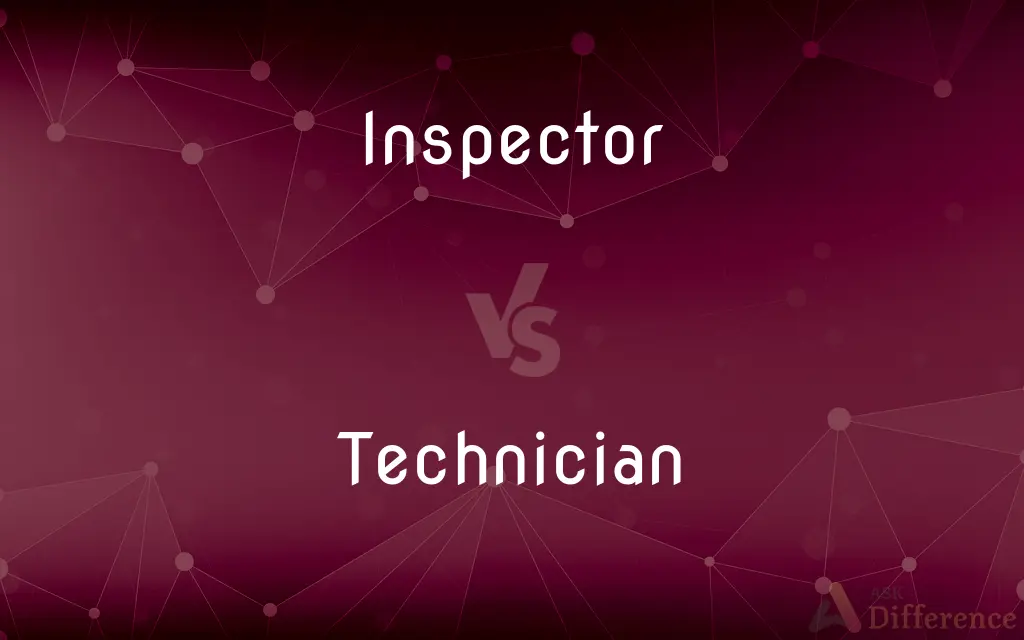Inspector vs. Technician — What's the Difference?
By Maham Liaqat & Urooj Arif — Updated on March 26, 2024
An inspector evaluates and ensures compliance with standards, while a technician focuses on the practical application of technical skills to repair, maintain, or install systems.

Difference Between Inspector and Technician
Table of Contents
ADVERTISEMENT
Key Differences
Inspectors are primarily concerned with assessing and verifying the quality, safety, and compliance of products, systems, or structures according to set standards and regulations. Their role involves detailed examinations and reporting on their findings to ensure everything meets the required legal and safety standards. Technicians, on the other hand, are hands-on professionals who apply technical skills to repair, maintain, or install various types of equipment and systems. They rely on a practical understanding of technology and machinery to troubleshoot problems and ensure functionality.
While inspectors are tasked with the critical evaluation of work against predefined benchmarks, focusing on identifying defects, ensuring safety, and verifying workmanship, technicians delve into the operational aspects, working to correct faults, optimize performance, and implement solutions. This distinction highlights the inspector’s role in evaluation and the technician’s role in application and problem-solving.
The training and qualifications for inspectors and technicians can vary significantly based on their fields of specialization. Inspectors often require knowledge of regulatory standards, codes, and assessment techniques, potentially necessitating certifications specific to their area of expertise (such as building, electrical, or health inspections). Technicians typically need a solid foundation in their technical field, which might include formal education in engineering technology, vocational training, or apprenticeships, emphasizing practical skills and problem-solving abilities.
Inspectors and technicians both play crucial roles in their respective fields, but their daily responsibilities differ markedly. Inspectors might spend their days reviewing documents, conducting on-site inspections, and compiling reports. Technicians, conversely, are likely to be found diagnosing issues with equipment, performing maintenance or installations, and ensuring the operational efficiency of systems.
The impact of their work also varies. An inspector’s assessments and reports can lead to necessary corrective actions, influence project approvals, and ensure public safety and compliance. A technician’s work directly affects the functionality and reliability of systems and equipment, impacting productivity, safety, and user satisfaction.
ADVERTISEMENT
Comparison Chart
Primary Role
Evaluates compliance with standards.
Applies technical skills to repair, maintain, or install.
Focus
Quality, safety, and legal compliance.
Practical problem-solving and system functionality.
Required Skills
Knowledge of standards and regulations, attention to detail.
Technical proficiency, troubleshooting, hands-on skills.
Qualifications
Certifications in specific standards or codes, experience.
Technical/vocational education, apprenticeships, experience.
Daily Responsibilities
Conducting inspections, reviewing documents, reporting.
Diagnosing problems, performing maintenance, installing systems.
Impact of Work
Ensures safety, compliance, and quality.
Ensures operational efficiency and reliability of systems.
Compare with Definitions
Inspector
Must meticulously examine various aspects to ensure adherence to regulations.
The health inspector examined the restaurant's kitchen for cleanliness and proper food storage.
Technician
Diagnoses and resolves issues with machinery or technology.
The computer technician recovered data from a failed hard drive.
Inspector
Keeps updated on laws and standards relevant to their field.
The electrical inspector is well-versed in the latest national electrical codes.
Technician
Ensures that systems operate efficiently and meet performance standards.
The network technician upgraded the company’s network to improve speed and reliability.
Inspector
Ensures that products, buildings, or processes are safe for use or occupancy.
The fire inspector evaluated the building’s fire escape routes and alarm systems.
Technician
Engages in direct interaction with the equipment or systems they specialize in.
The automotive technician performed a detailed engine overhaul.
Inspector
Inspects items or systems to ensure they meet established standards.
The building inspector checked the new construction for compliance with safety codes.
Technician
Regularly conducts maintenance checks and installs new systems.
The solar technician installed and tested new solar panels on the roof.
Inspector
Provides detailed reports on findings and suggests corrective actions.
After the inspection, the inspector provided a list of safety violations that needed addressing.
Technician
Utilizes technical knowledge to repair and maintain systems.
The HVAC technician repaired the air conditioning system in time for the summer heatwave.
Inspector
Inspector is both a police rank and an administrative position, both used in a number of contexts. However, it is not an equivalent rank in each police force.
Technician
A technician is a worker in a field of technology who is proficient in the relevant skill and technique, with a relatively practical understanding of the theoretical principles.
Inspector
One who is appointed or employed to inspect something.
Technician
A person employed to look after technical equipment or do practical work in a laboratory
A laboratory technician
Inspector
A police officer ranking next below superintendent.
Technician
One whose occupation requires training in a specific technical process
An electronics technician.
An automotive technician.
Inspector
A person employed to inspect something.
Technician
One who is known for skill in an intellectual or artistic technique.
Inspector
(law enforcement) A police officer ranking below superintendent.
Technician
A person who studies or practises technology; an expert in a particular technology.
The lift technician found the reason the lift wasn't working.
Inspector
(computing) A software tool used to examine something.
Technician
A person trained or skilled in the technical details of a particular art or science, especially one skilled at operating, maintaining, or repairing equipment, in contrast to the theory or informational content of a craft; - formerly also called a technicist.
Inspector
One who inspects, views, or oversees; one to whom the supervision of any work is committed; one who makes an official view or examination, as a military or civil officer; a superintendent; a supervisor; an overseer.
Technician
Someone whose occupation involves training in a specific technical process
Inspector
A police officer, typically holding a rank one below superintendent, and in some cases in charge of several precincts; as, inspector Clousseau is investigating the case.
Technician
Someone known for high skill in some intellectual or artistic technique
Inspector
A high ranking police officer
Inspector
An investigator who observes carefully;
The examiner searched for clues
Common Curiosities
Can an inspector also perform repairs?
Typically, inspectors focus on evaluation and compliance rather than performing repairs, which are handled by technicians.
Do technicians need to know about safety and regulations?
Yes, technicians must be aware of safety practices and may need to understand specific regulations relevant to their work.
Are there specialized inspectors and technicians for different industries?
Yes, both fields include specialists focused on particular industries, such as electrical, mechanical, or construction.
What qualifications are required to become an inspector?
Inspectors typically require a combination of education, experience in their specific field, and certifications related to safety and regulatory standards.
Is hands-on experience important for technicians?
Yes, hands-on experience is crucial for technicians, as it provides them with practical skills and expertise in troubleshooting and repairing systems.
Can a technician become an inspector?
Technicians with extensive experience and knowledge of regulations may transition into inspection roles, often requiring additional certifications.
Can inspectors issue penalties or fines?
Inspectors can recommend penalties or fines if they find non-compliance with regulations, depending on their jurisdiction and the nature of the inspection.
How do inspectors and technicians update their skills?
Both may pursue continuing education, certifications, and stay informed on industry standards and technological advancements.
How do inspectors and technicians contribute to safety?
Inspectors contribute to safety by ensuring compliance with safety standards and regulations, while technicians ensure that systems and equipment are functioning properly and safely.
What role do technicians play in product development?
Technicians can play a significant role in product development by providing insights into the practical application and maintenance of new technologies.
Share Your Discovery

Previous Comparison
Girth vs. Mirth
Next Comparison
Estate vs. HomeAuthor Spotlight
Written by
Maham LiaqatCo-written by
Urooj ArifUrooj is a skilled content writer at Ask Difference, known for her exceptional ability to simplify complex topics into engaging and informative content. With a passion for research and a flair for clear, concise writing, she consistently delivers articles that resonate with our diverse audience.
















































